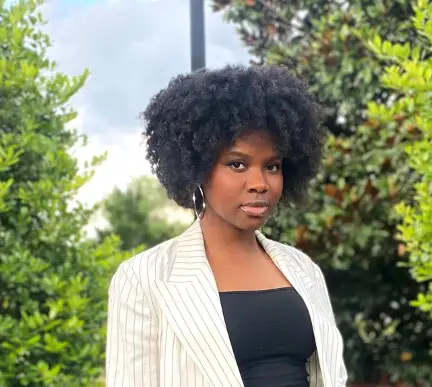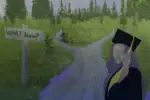The standard college experience for many students is house parties, clubs, staying up late during the week and spending the weekends enjoying life — basically, living life to the fullest and forgetting why they went to college in the first place. But if you weren’t like most college students, what were you doing? If you weren’t partying all the time, you were perhaps in your books and doing other activities to enhance your academic experience.
If you are a graduate, what was your college experience like? Bellow is a group of four recent college graduates that I interviewed about their college experience. Although each college student was asked the same questions, their experiences varied.
Graduate No. 1 — Kwizera
1. What is your name and what did you major in?
My name is Kwizera Ester, and I majored in public health education
2. What school did you attend?
I attended North Carolina Central University.
3. How was your academic experience?
My overall experience of college is bittersweet! I went in with a plan in mind and was sure of everything I wanted to do, but God had different plans for me. I had to change my major and that wasn’t easy for me. I went through depression and thought my life was over! I didn’t understand my life at that moment, I had no plan B and EVERYTHING was confusing — I didn’t know what to do. Apart from that, I enjoyed my time while living on campus. I met lifelong friends during my time on campus and met who I believe and know to be my future husband during my junior year. I had to learn how to balance out my school life and made sure I had fun as well.
4. What are three things you learned about yourself?
I learned how to voice my opinion. I learned that nothing is set in stone. I learned that if I put my mind to something I can get it accomplished
5. What are three things you wish you had done differently?
I wish I had a plan B for a different major before going to college. I wish I was more involved in different organizations. I wish I played a sport (for fun).
6. What advice would you give to those who are pursuing a degree in your field?
One thing I would advise someone who is trying to pursue a degree in my field is to make sure they ask themselves what exactly they want to do with the degree they will obtain.
7. How have your goals related to your career aspiration changed?
As I mentioned in question No. 3, my goals changed the moment I had to change my major from nursing to public health education. But deep inside by the grace of God, I want to continue pursuing a degree in nursing sometime in the future coming years.
8. How is job hunting or have you found a job?
I am applying and have been applying for EVERYTHING and ANY job opportunities I see. But of course, I’m choosing and picking those places.
Graduate No. 2 — Nishimwe
1. What is your name and what did you major in?
My name is Nishimwe Charirote and [I] majored in psychology with a minor in sociology.
2. What school did you attend?
I first attended Guilford Technical Community College and got my associate’s degree. I then transferred to the University of North Carolina at Greensboro and majored in psychology.
3. How was your academic experience?
My college wasn’t the best because I didn’t get the full college experience. I didn’t stay on campus […] because my parents wouldn’t let [me] so I was home taking care of my siblings (cooking and cleaning and making sure everything was good). After that, I would to school and work so I never had the experience of being a college student.
4. What are three things you learned about yourself?
The three things I learned about myself are that: I am slow, super outgoing, and smart.
5. What are three things you wish you had done differently?
The three things I wish I had done differently are to socialize more and stand up for myself, and I don’t have a [third] one because those two sum up everything for me.
6. What advice would you give to those who are pursuing a degree in your field?
The advice I would give is that they need to work at getting connections, internships, and experience in something related to that field because it will help them get a job and if they want to continue school it will help them stand out when applying for graduate school.
7. How have your goals related to your career aspiration changed?
My goals related to my career have not changed. I know that I got into psychology to help people and I realized that I don’t need to attend graduate school to do it because my bachelor’s allows me to do it. If I wanted to be on a different level or maybe treat people I can do that but I tried it and I didn’t like it. I know that social services are what [I] want to do for the rest of my life and my degree allows me to do it. As of right now, that is currently what I’m doing and [I’m] utilizing everything I learned in school to help others and better serve them.
8. How is job hunting or have you found a job?
My job hunting has ended and I have found a job. […] [It] took about 3-6 months to get the job which is the amount of time it takes one to find a job after college.
Graduate No. 3 — Alice
1. What is your name and what did you major in?
Alice, agribusiness and food industry management
2. What school did you attend?
North Carolina Agricultural and Technical State University
3. How was your academy experience?
Amazing and like no other. The professors are caring in my department and have the “student first” mentality
4. What are three things you learned about yourself?
It’s okay to change your mind. Stick to it. Not everyone is out to get you
5. What are three things you wish you had done differently?
Getting to know others. Being open. Join clubs or school organizations
6. What advice would you give to those who are pursuing a degree in your field?
Get to know the professors and students in your program because it will assist you in acclimating to college life. Join the clubs or organizations that are specific to the field and not just as a member but also as a board member because it assists in being more involved and helps you to grow as a person. Also, not everyone needs to be a friend but rather think of classmates as future employers and advocates. So in short, get to know people for the sake of getting to know people. You simply never know.
7. How have your goals related to your career aspiration changed?
More focused and kind of know the type of experiences that I would like to pursue to reach the goal.
8. How is job hunting or have you found a job?
It was good. Needed to know the job and how to sell myself [for] the specific job title. It was also overwhelming.
Graduate No. 4 — Alex
1. What is your name and what did you major in?
My name is Alex, I majored in computer science with a concentration in cyber security.
2. What school did you attend?
I attended the University of North Carolina at Charlotte.
3. How was your academic experience?
It was a typical experience. Went to class, made friends, and partied on the weekends. Mostly had to teach myself though; you aren’t really taught how to code, you’re just introduced to computer science concepts.
4. What are three things you learned about yourself?
- I don’t care much for nightclubs.
- I’m capable of accomplishing a lot when I actually try.
- I don’t like waking up early.
5. What are three things you wish you had done differently?
- Gotten more student aid.
- Not have accepted them marking me for out-of-state tuition for my first year even though I qualified for in-state tuition.
- Taken the time to really think about what I wanted to get out of going to a university and maybe considering not going for the degree I went for.
6. What advice would you give to those who are pursuing a degree in your field?
Take the time and research exactly [what] you want to do with that degree. The sooner you do, the better. I’ve seen many people start a computer science degree only to quit after the first semester and switch to a business major as a safety net. There are so many concentrations in computer science that you may not even need to end up coding. Explore all those options and make sure you like whichever one you choose to pursue.
Also, don’t expect to be “taught” in the traditional sense; you will always have to learn on your own, and that is where 80% of your learning comes from. Classes just give you a guide.
7. How have your goals related to your career aspiration changed?
My career goals remain the same, although I’m not sure of the exact path I want to take. Whether I want to always be a programmer, software architect, or a cyber security specialist remains to be decided.
8. How is job hunting or have you found a job?
I found a job; there’s a high demand in my field so as long as you know what’s what and can back it up, you’ll be able to find a job. You do however need to continually learn new technologies and stay current.
If you’re going for a coding position make sure to be good at programming before your interview. Coding interviews are a thing, so you may have to code a bit for the position you’re applying for (live in the interview). This was an aspect I struggled in fresh out of college.

















